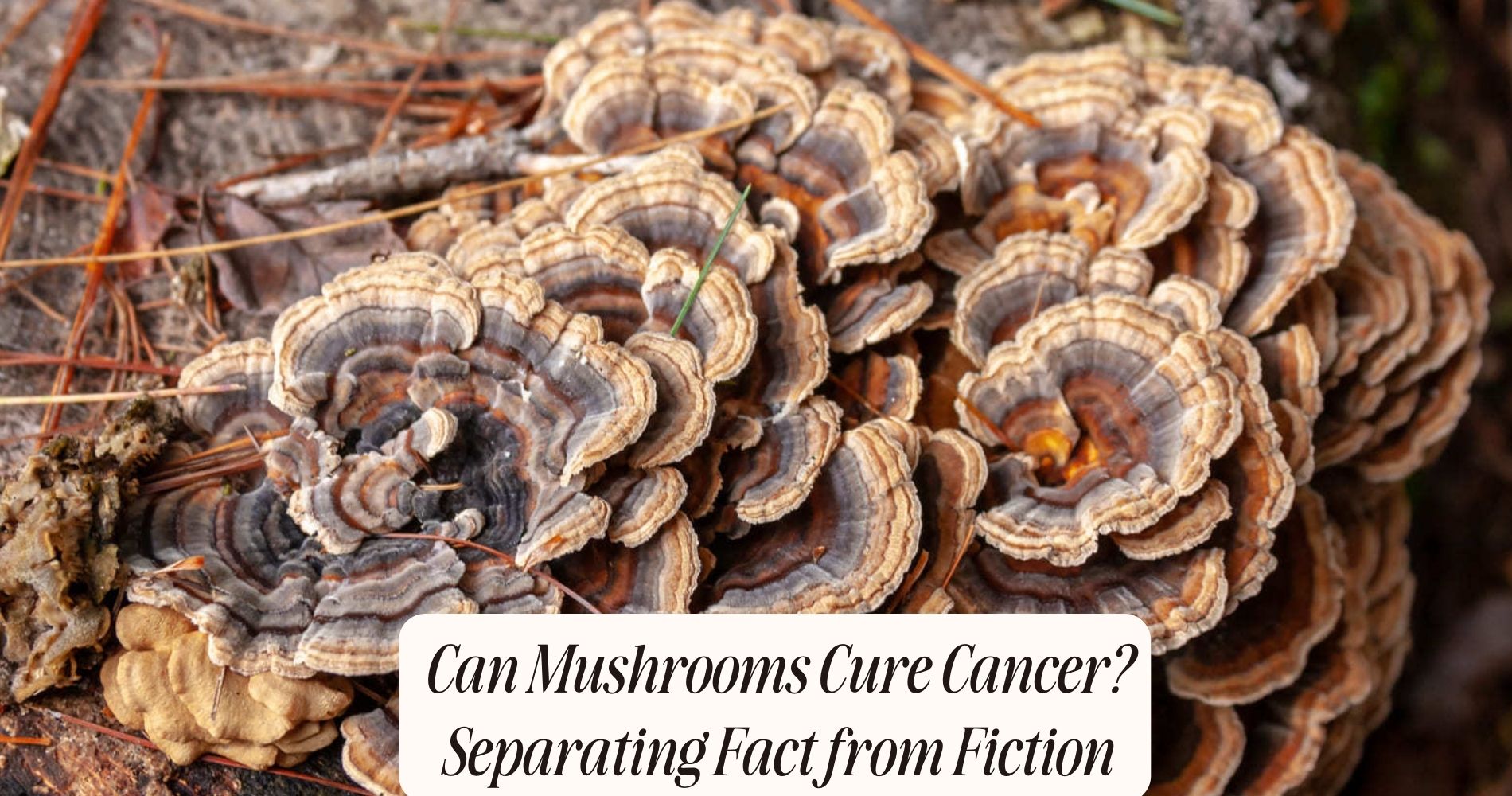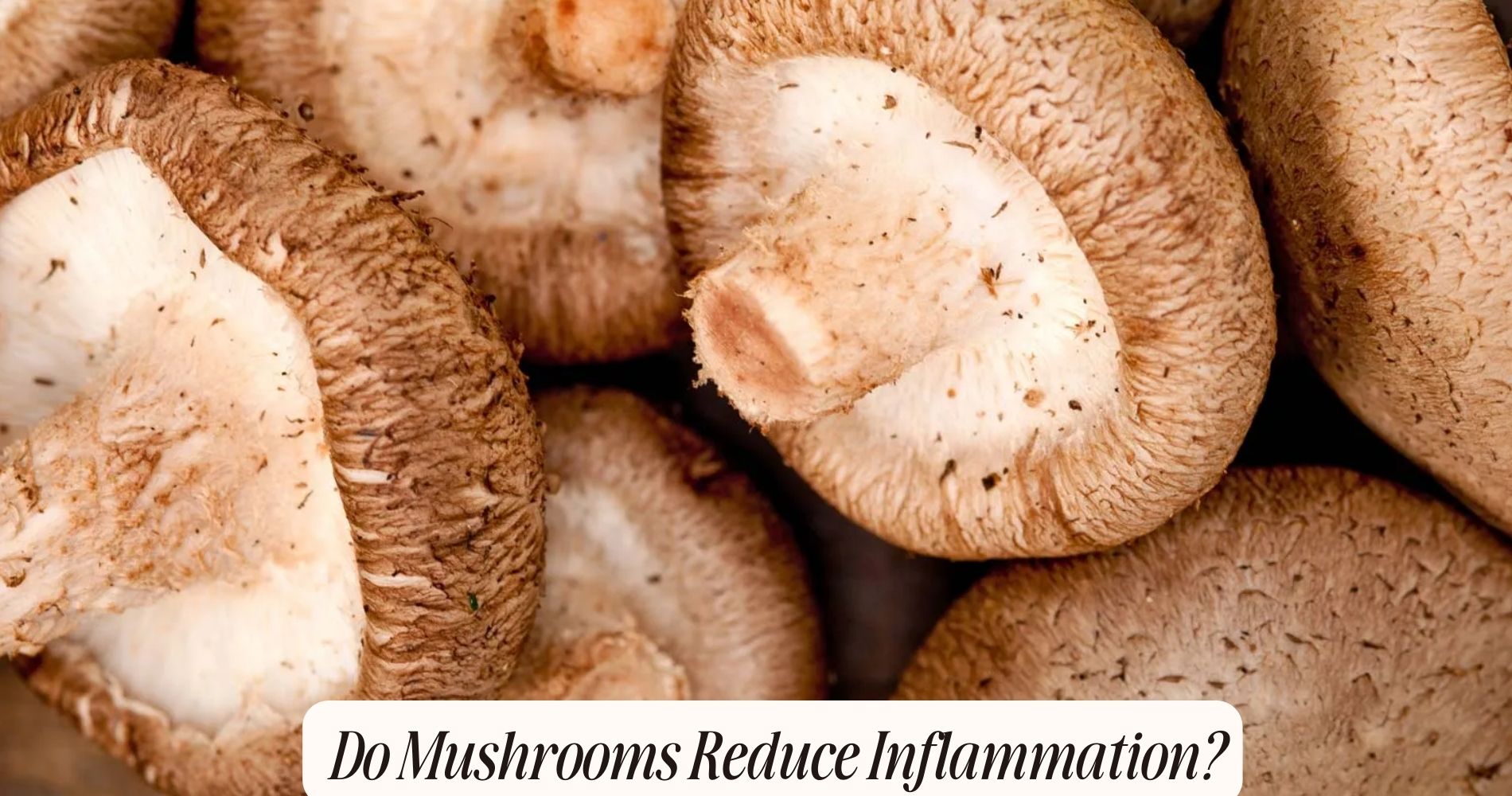
Can Mushrooms Cure Cancer? Separating Fact from Fiction
Do mushrooms cure cancer? Mushrooms won't outright cure cancer, but they contain compounds with potential anti-cancer properties. Research shows that polysaccharides like beta-glucans can stimulate your immune system, while triterpenoids in mushrooms like Reishi and Shiitake may inhibit tumor growth. However, these findings come primarily from preclinical studies. Human trials are still needed to confirm their efficacy and safety. While mushrooms could complement traditional treatments by enhancing immune response and possibly reducing tumor size, they're not a substitute for conventional cancer therapies. To understand the complete picture, consider exploring how ongoing studies are shaping our knowledge of mushrooms in cancer treatment.
Common Myths About Mushrooms
Despite widespread beliefs, not all mushrooms have miraculous cancer-curing properties. Many people hold onto folklore beliefs that edible varieties of mushrooms can eliminate cancer cells entirely. While it's true that some mushrooms contain compounds with potential health benefits, the pivotal assertion that they can cure cancer isn't supported by clinical evidence.
In folklore, mushrooms like reishi and shiitake are often hailed as cure-alls. These edible varieties are indeed rich in nutrients and possess bioactive compounds. However, their medicinal value shouldn't be overstated. Consuming these mushrooms can contribute to overall health, but using them as a sole treatment for cancer isn't advisable.

Let's be clear: modern medicine hasn't validated the idea that mushrooms can replace conventional cancer treatments. While integrating mushrooms into your diet may offer some benefits, it's essential to consult healthcare providers for evidence-based treatments. Relying solely on folklore beliefs can be dangerous, especially when dealing with a serious illness like cancer.
Scientific Research Overview
You'll find that scientific research on mushrooms and cancer has uncovered some promising results.
Key studies suggest mushrooms may have potential anti-cancer properties, such as immune system modulation and inhibition of cancer cell growth.
While clinical trials are still ongoing, the initial findings offer cautious optimism for their future therapeutic use.
Key Findings on Mushrooms
Recent scientific studies have highlighted several promising compounds in mushrooms that may have anti-cancer properties. With their rich fungal biodiversity, mushrooms are more than just culinary delights; they're a treasure trove of bioactive compounds.
Beta-glucans, polysaccharides, and triterpenoids are some of the key compounds researchers have been focusing on. These substances have shown potential in modulating the immune system and inhibiting cancer cell growth in preliminary studies.
For instance, Shiitake mushrooms contain lentinan, a type of beta-glucan that has garnered attention for its ability to enhance the immune response. Meanwhile, Reishi mushrooms are rich in triterpenoids, which have been studied for their anti-inflammatory and anti-tumor properties. The culinary uses of these mushrooms extend beyond flavor; they could be part of a holistic approach to health and wellness.

However, it's essential to approach these findings with cautious optimism. While lab results are promising, clinical trials in humans are necessary to fully understand the implications. Your interest in mushrooms as potential anti-cancer agents should be balanced with a realistic understanding of current scientific limitations.
Always consult healthcare professionals before making any changes to your treatment plan.
Potential Anti-Cancer Properties
Building on these promising lab results, scientific research has begun to explore the potential anti-cancer properties of mushrooms in more depth. Various studies have examined compounds such as polysaccharides and triterpenes found in mushrooms, which have shown potential in inhibiting cancer cell growth and enhancing immune responses.
For instance, beta-glucans, a type of polysaccharide, have been highlighted for their ability to stimulate the immune system, an important factor in combating cancer.
Mushrooms have long been used as traditional remedies in various cultures, and their culinary uses are widespread. This dual role has sparked interest in their therapeutic potential. Specific species like Reishi, Shiitake, and Turkey Tail are under investigation for their bioactive compounds that may offer anti-cancer benefits.

However, it's crucial to approach these findings with cautious optimism. While preclinical studies are promising, they're primarily conducted in vitro or using animal models. The translation of these results to human applications requires rigorous scientific validation.
Despite the historical and culinary significance of mushrooms, it's important to acknowledge that more research is needed to substantiate their role in cancer treatment fully. This ensures that any potential treatments are both safe and effective.
Clinical Trial Insights
Clinical trials have started to provide valuable insights into the potential anti-cancer benefits of mushrooms, though much remains to be explored. Researchers have been conducting studies to evaluate various mushroom extracts and compounds, such as polysaccharides and beta-glucans, for their anti-cancer properties. These trials often focus on patient eligibility criteria to guarantee that participants have specific types of cancer and are at particular stages of the disease. This helps in generating more accurate and applicable results.
One major consideration in these trials is the placebo effect. It's crucial to distinguish between actual therapeutic benefits and improvements due to patients' belief in the treatment. Double-blind, placebo-controlled studies are crucial in this regard. For instance, some trials have shown that patients receiving mushroom extracts reported feeling better, but researchers had to carefully analyze whether these improvements were statistically significant compared to those receiving a placebo.
Moreover, while early results are promising, indicating potential benefits like improved immune response and reduced tumor growth, larger and more thorough trials are necessary. Such studies will help determine the best dosages, long-term effects, and possible interactions with conventional cancer treatments.
Key Anti-Cancer Compounds
Among the key anti-cancer compounds found in mushrooms, beta-glucans and polysaccharides stand out for their potential to modulate the immune system and inhibit tumor growth. Beta-glucans research has shown these compounds can activate various immune cells, including macrophages and natural killer cells, which play an important role in identifying and destroying cancer cells. This immune-modulating effect is pivotal, as it helps the body's own defenses to better target and eliminate malignant cells.
Polysaccharide extracts, particularly those derived from medicinal mushrooms like Reishi and Shiitake, have demonstrated promising anti-tumor properties. These extracts appear to interfere with cancer cell proliferation and induce apoptosis, a process where cancer cells are programmed to die. The precise mechanisms are still under investigation, but the existing data supports their role in enhancing the effectiveness of conventional cancer treatments.
While these findings are encouraging, it's crucial to approach them with cautious optimism. The potential benefits of beta-glucans and polysaccharides are supported by preliminary studies, but further research is needed to fully understand their efficacy and safety. By considering these compounds as complementary to mainstream treatments, you can gain a more all-encompassing approach to cancer care.
Clinical Trials and Studies
Numerous clinical trials and studies have investigated the potential anti-cancer properties of mushrooms, offering promising yet preliminary insights into their efficacy. Researchers have focused on various types of mushrooms, including reishi, shiitake, and turkey tail, examining their impact on cancer cells both in vitro and in human subjects. These studies often involve carefully controlled conditions, with some employing double-blind, placebo-controlled designs to guarantee the validity of the results.

One of the key factors in these studies is the sample size. Larger sample sizes generally provide more reliable data, reducing the potential for anomalies. However, many of these trials have relatively small sample sizes, making it difficult to draw definitive conclusions. Despite these limitations, some studies have shown that specific mushroom extracts can reduce tumor size, enhance immune response, or improve the quality of life for cancer patients.
The placebo effect is another consideration in these trials. It's important to account for this when interpreting the results, as patient expectations can influence outcomes. While the initial findings are encouraging, more extensive and rigorous studies are needed to better understand the potential benefits mushrooms may offer in cancer treatment.
Potential Benefits and Risks
When considering mushrooms in cancer treatment, you should examine both their medicinal properties and potential health concerns. Research suggests that certain compounds in mushrooms may boost the immune system and inhibit tumor growth.
However, it's essential to weigh these benefits against possible side effects and interactions with conventional therapies.
Medicinal Properties Examined
Scientific studies have shown that certain mushrooms may offer both potential benefits and risks in the context of cancer treatment. For centuries, traditional medicine has utilized mushrooms like Reishi, Shiitake, and Turkey Tail for their supposed healing properties. Modern research suggests these fungi contain bioactive compounds that could support holistic healing by potentially enhancing immune function and inhibiting tumor growth.
Reishi mushrooms, for instance, are rich in polysaccharides and triterpenes. These compounds have demonstrated anti-cancer properties in cell cultures and animal studies. Polysaccharides may enhance the body's immune response, while triterpenes could inhibit the proliferation of cancer cells. Shiitake mushrooms contain lentinan, a compound that has shown promise in boosting the immune system and possibly improving the efficacy of conventional cancer treatments.
However, it's important to be cautious. The majority of these studies are preliminary and often conducted in controlled environments that may not replicate real-world complexities. Additionally, not all mushrooms are beneficial; some can be toxic or interact negatively with conventional treatments. Always consult with your healthcare provider before incorporating mushrooms into your cancer treatment plan.
While the potential is there, more rigorous clinical trials are needed to fully understand the benefits and risks.
Health Concerns Addressed
While the medicinal properties of mushrooms offer promising avenues for cancer treatment, it's important to consider these potential benefits against the possible health risks. Research indicates that certain mushrooms, like reishi and turkey tail, can provide significant immune support. They contain beta-glucans, which may enhance your immune system's ability to fight cancer cells. However, it's vital to remember that these findings are still preliminary, and more extensive clinical trials are necessary.
On the dietary benefits side, mushrooms are low in calories and packed with essential nutrients, such as selenium, vitamin D, and antioxidants. These attributes make them a valuable addition to a cancer-preventive diet. But, they shouldn't be considered a standalone treatment. Combining mushrooms with other medical treatments and a balanced diet can offer more thorough health benefits.

However, there's also the risk of adverse effects. Some mushrooms can interact with medications you're taking, leading to undesirable side effects. Additionally, consuming wild mushrooms without proper identification can pose poisoning risks.
Always consult your healthcare provider before adding medicinal mushrooms into your regimen to make sure they complement your existing treatment plan without causing harm.
Practical Considerations
When considering incorporating mushrooms into your diet for their potential cancer-fighting properties, it's essential to evaluate their safety, dosage, and interactions with other treatments. First, you should adhere to established dosage guidelines. While research is still ongoing, studies suggest that consuming 1-2 grams of dried medicinal mushrooms daily can be beneficial. Always consult your healthcare provider to tailor the dosage to your specific needs.
Next, consider the preparation methods. Fresh or dried mushrooms can be added to soups, teas, or capsules. Extracts and tinctures are also available, offering a concentrated form of beneficial compounds. Proper preparation is vital to maximize their potential benefits. For instance, cooking mushrooms can help break down chitin, a component that makes them difficult to digest, thereby enhancing nutrient absorption.
It's equally important to be aware of possible interactions with other treatments. Some mushrooms may interact with chemotherapy drugs or anticoagulants, potentially altering their efficacy. Always disclose any supplements you're taking to your healthcare team to avoid adverse effects.
Frequently Asked Questions
Can Mushrooms Be Used Alongside Traditional Cancer Treatments?
Yes, you can use mushrooms alongside traditional cancer treatments. They offer immune support and contribute to holistic healing. However, always consult your healthcare provider to verify they're safe and effective for your specific situation.
How Do Different Types of Mushrooms Compare in Their Anti-Cancer Properties?
You're curious about how different types of mushrooms compare in their anti-cancer properties. Reishi benefits include immune support, while Turkey Tail promotes gut health and may boost the immune system. Both show promise but need more research.
Are There Any Known Interactions Between Mushrooms and Chemotherapy Drugs?
You should be cautious about mushroom toxicity when combining them with chemotherapy drugs. Some mushrooms may have synergistic effects, enhancing treatment efficacy, but it's important to consult your oncologist for evidence-based guidance on safe usage.
What Is the Recommended Dosage of Medicinal Mushrooms for Cancer Prevention?
You should consult clinical trials and follow dosage guidelines set by experts. While medicinal mushrooms show promise in cancer prevention, it's essential to rely on evidence-based recommendations and not self-prescribe without professional guidance.
Are There Specific Diets That Enhance the Effectiveness of Mushrooms in Cancer Treatment?
When considering specific diets to enhance mushrooms' effectiveness in cancer treatment, you should focus on nutritional balance and include dietary supplements. Evidence suggests a balanced diet may support overall health alongside traditional cancer therapies.
Conclusion
To conclude, while mushrooms show promise with their anti-cancer compounds and ongoing clinical research, it's important to separate myth from fact. Current evidence suggests potential benefits, but mushrooms shouldn't replace conventional treatments. Instead, consider them a complementary approach under medical supervision.
Always consult your healthcare provider before adding any new supplements to your regimen. As research evolves, staying informed will help you make the best decisions for your health.




